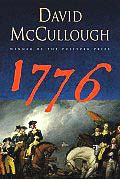Ramble on Prose

So it’s been almost a month since my last post, and while I’ve been pretty slack on the blog front, I’ve been pretty busy on the everything-else-in-my-life front. School and work have kept me swapping hats consistently, and now I can kind of catch a brief breather because its fall break and I don’t work again until Friday.
I’m hoping to get a good chunk of Truman read by the time school starts back. David McCullough is coming to speak at Guilford in November and I’ve been picked by the history department to go to the pre-speech reception. This means that there is an off-chance that I might meet him, and I want to get some of his work under my belt before blurting out whatever inanity I’m going to blurt out. Reading Truman might temper the blurtation a little. I read 1776 a couple of summers ago. I just picked it up—it holds a place on my desk (next to Doonesbury)—and its amazing what a well made book just feels like when you flip through it. The pages have that rough unevenness when the book is closed, and the picture inserts are slick and full of period maps and portraits. I’m getting all-a-flutter just looking at it. But seriously, I remember being riveted by his description of the hauling up of the cannons by the rebel army to Dorchester Heights, overlooking Boston. I’m looking forward to being in the presence of McCullough. He is supposed to speak about Nathanial Greene.

Tobias Wolff
So this leads me on to another theme that I’ll try to bridge with the famous author meeting the admirer theme. Actually no bridge is necessary because it’s the same subject. Or, that subject leads me to another. Lindsay was here on Thursday to go to a reception, and she happened to leave a back issue of the New Yorker lying around. She must have picked it up to read while she was waiting for something. Anyway, I picked it up and flipped through it and soon found myself engrossed in a fiction piece—this post is on the verge of becoming “quaint”—by Tobias Wolff called Class Picture. There were different reasons why this story drew me in; first and foremost, it is so fucking funny (there, just erased the quaintness). It also takes place in a boarding school, which reminded me of my boarding school experience, and how, in my senior year, I moped around in a heavy wool overcoat hoping Zelda Fitzgerald’s ghost would spring up with a martini shaker and proceed to seduce me.
The story is about a visit to the school by Robert Frost. There is a poetry contest in which the winner gets to spend time with America’s poet laureate the morning after Frost gives a speech in the school chapel. The humor comes from Wolff’s description of the contenders for the honor, who all have a kind of unformed, neophyte brilliance, but not without the self-consciousness and mood swings that betray their age. Wolff describes two characters, heavily under the influence of Hemingway, speaking in that jilted, short, Morse code style—about making their beds. I almost rolled off the couch.
But the story was also very true to me. A few weeks ago in English class, we had been talking about what theorists can do when they analyze a piece of fiction. We agreed that the process was like an archeological excavation, in that as you remove layers to reveal more of the excavation you also destroy that particular site forever. Same with literature. It was with this idea in the back of my mind that this quote from Wolff’s story jumped out at me. Wolff is speaking of the reverence that the English teachers at the school commanded.
How did they command such difference—English teachers?
Adept as they were at dissection, they would never leave a poem or novel strewn about in pieces like some butchered frog reeking of formaldehyde. They would put it back together with history and psychology, philosophy, religion; even, on occasion, science. Without pandering to your presumed desire to identify with the hero of a story, they made you feel that what mattered to the writer had consequences for you, too.
How beautiful. And it is true.
I’m going to end this post now. After that quote, I don’t feel that my ability is up to anything else insightful right now, and I would hate to ruin it by prattling on further.

0 Comments:
Post a Comment
Subscribe to Post Comments [Atom]
<< Home